Newsletter – April 2020
PRESIDENT’S COLUMN
Doing Geography in the Age of Coronavirus, or How is Everybody Coping?
By David Kaplan
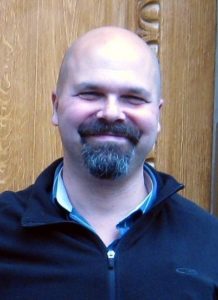
You hear it from everyone you know: these are strange and frightening times. While most of us have witnessed major disease outbreaks from afar – Ebola, SARS, Swine Flu – it is another thing to encounter something so directly, so personally, so comprehensively. Pandemic: what once seemed part of a grim historical record has smashed into our contemporary reality.
ANNUAL MEETING
Countdown to the Virtual AAG Annual Meeting

We are less than a week away from the Annual Meeting! Thank you to everyone for your help and support in pivoting with us to a virtual format. The virtual Annual Meeting, April 6-10, will feature 150+ sessions and panels on a wide range of topics. There are also many digital posters already uploaded to the online gallery! Be sure to browse the virtual session gallery to plan your attendance. Everyone who was previously registered for the in-person meeting in Denver is already registered for the virtual event. For those registering for the first time, you can do so here. You will access the online sessions through the virtual session gallery (links will be available once you are logged in.)
The Virtual AAG Meeting will feature several exciting sessions and plenaries. The new breaking theme: Geographers Respond to COVID-19 will highlight the multifaceted expertise and perspective of geographers on the pandemic and its medical, social, economic, political, cultural, and ethical implications. James Whitehorne, Chief of the Redistricting & Voting Rights Office of the U.S. Census Bureau, will join for a special plenary on the 2020 census and congressional redistricting. The AAG’s Climate Change Task Force will hold a plenary from Kevin Anderson on academia’s responsibility to uphold the Paris commitments. Developed throughout the fall, the AAG will continue to hold its workshop on recruiting students to geography programs.
To learn more about the meeting and plan for your participation, please visit the Virtual AAG Meeting Website. For any questions, please contact us at virtualmeeting [at] aag [dot] org. We look forward to seeing you online soon.
E-Book Published on the Rocky Mountain West

Written to commemorate the 2020 AAG Annual Meeting in Denver, CO and free to download, this e-book titled “The Rocky Mountain West: A Compendium of Geographic Perspectives,” offers a broad range of geographic insights about the Rocky Mountain West. The peer-reviewed collection of essays address the physical environment and cultural landscapes unique to the region, the interaction between people and the environment, the impact of development on land-use change, and perspectives on the urban geographies of Denver. Due to widespread health concerns around the world at the time, the in-person annual meeting has been canceled, but this special e-book lives on.
Careers & Professional Development Sessions at the Virtual Meeting
Despite the cancellation of the in-person Annual Meeting in Denver, there will still be a virtual track of over a dozen Careers & Professional Development sessions. These will cover a range of topics from working as a geographer in the public, private, nonprofit, or academic sector to internships and work-based learning opportunities for geography students to computational skills in the geospatial services industry to diversity in academia and the workforce and more. Featured sessions include an Open Forum on Diversity in Geography where panelists will share their experiences as leaders in promoting and celebrating diversity within the AAG and throughout the discipline of geography and reflect on the challenges they face; and Exhibitor Presentations with talks from Esri, U.S. Census Bureau, Avenza Systems, the American Meteorological Association, AAAS, and others.
See the full schedule of virtual Careers & Professional Development sessions
Registrations being accepted for the Virtual AAG Annual Meeting!
AAG is facilitating a virtual annual meeting April 6-10, in response to restrictions on travel and gathering during the COVID-19 pandemic. The virtual conference will offer more than 130 sessions and panels. Registration is now open for those not previously registered for the in person meeting and who now wish to attend the virtual meeting.
- Register for the 2020 Virtual AAG Annual Meeting
- View the virtual program and start planning your schedule
- Submit a cancellation request
- Get details about the 2020 Virtual AAG Annual Meeting
PUBLICATIONS
New Books in Geography — February Available
 There are always new titles in geography and related disciplines to be found on the New Books in Geography list. Some of these books will be reviewed in the AAG Review of Books. Persons wishing to volunteer their reviewing services for new books should have the requisite qualifications and demonstrable prior knowledge and engagement with the subject area, preferably through publications. Please contact the editors at aagrb [at] lsu [dot] edu if you are interested in being a reviewer.
There are always new titles in geography and related disciplines to be found on the New Books in Geography list. Some of these books will be reviewed in the AAG Review of Books. Persons wishing to volunteer their reviewing services for new books should have the requisite qualifications and demonstrable prior knowledge and engagement with the subject area, preferably through publications. Please contact the editors at aagrb [at] lsu [dot] edu if you are interested in being a reviewer.
Browse the full list of new books.
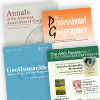 In addition to the most recently published journal, read the latest issue of the other AAG journals online:
In addition to the most recently published journal, read the latest issue of the other AAG journals online:
• Annals of the American Association of Geographers
• The Professional Geographer
• GeoHumanities
• The AAG Review of Books
ASSOCIATION NEWS
AAG to Participate in Release of 2018 NAEP Geography Report Card
The National Assessment Governing Board (NAGB) has announced April 23, 2020 as the release date for the 2018 National Assessment of Educational Progress (NAEP) Geography Report Card. Popularly known as the Nation’s Report Card, NAEP is the largest, continuous, national assessment of what U.S. students know and can do in school subjects. In anticipation of the 2018 NAEP Geography Report Card, the AAG will host a virtual panel session, “Using NAEP Geography Datasets to Improve Geography Education,” on Wednesday, April 8 from 1:45 PM – 3:00 pm MDT. Later this spring, the AAG will contribute to a separate NAEP webinar that focuses on the details of the 2018 geography assessment while highlighting recent work by the National Center for Research in Geography Education (NCRGE).
Learn more about NAEP and the virtual sessions.
Earth Day Turns 50 on April 22
There may have been no other time in recent memory when the entire world’s population has felt so conscious of itself as part of a shared experience on the planet, due to COVID-19. During this month, which also happens to mark the 50th anniversary of Earth Day, AAG will highlight the importance of geoliteracy in making sense of our world and taking action to care for it. In particular, watch for AAG’s new column in the upcoming ArcNews. The Spring issue features Executive Director Gary Langham sharing the critical impact that spatial visualization has on public awareness and innovative local responses for climate science and action.
AAG Now Accepting Listings to the 2020 Edition of The Guide
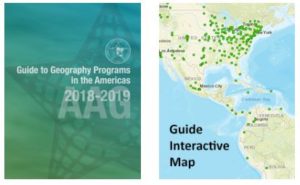
The AAG’s Guide to Geography Programs in the Americas serves as a complete and invaluable reference for faculty, prospective students, government agencies, and private firms in the United States, Canada, Latin America, and throughout the world. Listing your geography program in the Guide ensures that geographers and prospective students will be able to learn about your program and how to reach you. Your program will also appear alongside hundreds of other top geography programs in our Interactive Map that students can use to explore and discover geography programs, with easy-to-use search tools to filter programs by degree type, region, program specialization, and more. The deadline for submitting a listing is Friday, May 15, 2020.
For more information and to list your program, please contact Mark Revell at guide [at] aag [dot] org.
Collaboration: Harnessing Geospatial Elements of Social Science Data
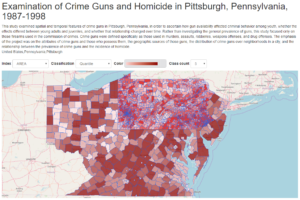
In March, AAG co-sponsored a webinar with the Inter-university Consortium for Political and Social Research, exploring varied approaches and tools for harnessing geospatial data from within ICPSR’s rich resource base. Highlights included access, best practices, and security protocols in place for protecting privacy and ethical use of data.The recording of the webinar, offering specific overviews of resources and instructions for their use, see this link.
AAG and ICPSR will also co-host a workshop on the topic of ethical access to ICPSR’s geospatial data at the Virtual Annual Meeting.
POLICY CORNER
The COVID-19 Stimulus Package Passes
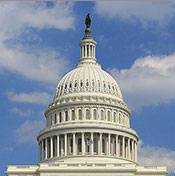
Last Friday, the House and Senate passed a $2 trillion relief bill to provide aid for the many businesses, organizations, families and individuals facing the impacts of the ongoing coronavirus public health crisis. The bill passed with bipartisan support and was signed into law later that same day by the President. In addition to spending measures that will boost various sectors of the economy, most Americans will also receive a check to the tune of $1,200. While these measures are part of a first wave federal response, there will no doubt be policy initiatives in the coming months that further address the crisis and its rippling impacts.
The stimulus package includes provisions to assist universities and K-12 education as well as federally funded research. Universities are receiving an injection of $14 billion worth of aid while federally funded research being conducted to understand and combat COVID-19 will receive a $1.3 billion boost. Within NSF, the stimulus package includes $75 million for Research and Related Activities (RRA) to “prevent, prepare for, and respond to coronavirus, domestically or internationally, including to fund research grants and other necessary expenses” and $1 million for Agency Operations and Award Management (AOAM) to respond to COVID-19 impacts on the grant administration process. Separately, primary and secondary schools are receiving $13 billion of assistance to maintain operations as more than 55 million children are out of school.
In the News:
- The U.S. Census has suspended all field operations until April 15th and has suspended all in-person interviews for its ongoing surveys in an effort to slow the spread of coronavirus. They are widely encouraging self-response online, by phone, or by mail. As of March 31st, 36.2% of households had responded to the 2020 Census.
- The National Science Foundations (NSF) has established a digital resource for COVID-19 information which includes links to their latest guidance on upcoming program deadlines as well as budget and logistics questions pertaining to existing awards that may be affected in various ways. They are also re-assessing program deadlines on an ongoing basis and are updating changes to existing deadlines on their website.
MEMBER NEWS
Geographers Act on COVID19
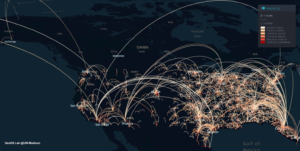
On March 23, AAG asked how our members and followers are responding to the COVID19 pandemic. We got an impressive range of responses from all over the world, showing geographers whose work is helping to identify and connect vulnerable people to services, identify patterns in disease transmission, and offer context and historical perspectives on the COVID-19 crisis.
Read how fellow geographers are responding to the pandemic.
Congratulations to Students of Regional Geography Bowl Teams
 With the cancellation of the in-person AAG Annual Meeting due to restrictions on travel and gathering during the COVID-19 pandemic, the 2020 World Geography Bowl has regrettably been canceled. The World Geography Bowl Executive Committee and the AAG wish to acknowledge the students who qualified for their regional geography bowl teams and who will not get a chance to participate in what is a highly anticipated event for students, spectators, and volunteers alike. We look forward to an exciting bowl at the 2021 AAG Annual Meeting in Seattle April 7-11!
With the cancellation of the in-person AAG Annual Meeting due to restrictions on travel and gathering during the COVID-19 pandemic, the 2020 World Geography Bowl has regrettably been canceled. The World Geography Bowl Executive Committee and the AAG wish to acknowledge the students who qualified for their regional geography bowl teams and who will not get a chance to participate in what is a highly anticipated event for students, spectators, and volunteers alike. We look forward to an exciting bowl at the 2021 AAG Annual Meeting in Seattle April 7-11!
Call for Career Profiles
The AAG is conducting a new series of interviews with professional geographers to highlight the important work geographers perform in their careers. Once completed, the interviews will be featured on the AAG website as part of our monthly Profiles of Professional Geographers series. For the profiles we seek practicing geographers representing all sectors of the workforce, including those working in private business, government (state, regional, local and federal), nonprofit/NGOs, and education (K-12, community colleges, and higher ed) to showcase the broad range of career opportunities available to geographers.If interested, please email Mark Revell at mrevell [at] aag [dot] org. We hope you will consider participating!
RESOURCES AND OPPORTUNITIES
Upcoming AGI Webinar on Mapping Displacement and Subsidence
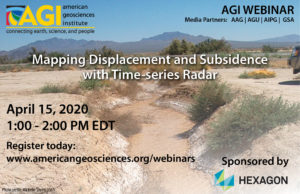 The American Geosciences Institute is offering a free webinar titled Mapping Displacement and Subsidence with Time-series Radar on April 15, 2020. In this webinar, experts from Hexagon and the Arizona Department of Water Resources will discuss the use of time-series displacement maps with a high point density for monitoring and mitigating subsidence due to subsurface extraction of resources such as water or hydrocarbons. Speakers at the webinar include Derrold Holcomb, Product Manager, Advanced Sensor Software, Hexagon Geospatial; and Brian Conway, Geophysics Unit Supervisor, Arizona Department of Water Resource.
The American Geosciences Institute is offering a free webinar titled Mapping Displacement and Subsidence with Time-series Radar on April 15, 2020. In this webinar, experts from Hexagon and the Arizona Department of Water Resources will discuss the use of time-series displacement maps with a high point density for monitoring and mitigating subsidence due to subsurface extraction of resources such as water or hydrocarbons. Speakers at the webinar include Derrold Holcomb, Product Manager, Advanced Sensor Software, Hexagon Geospatial; and Brian Conway, Geophysics Unit Supervisor, Arizona Department of Water Resource.
Call for Nominations for the USGS 2020 William T. Pecora Award
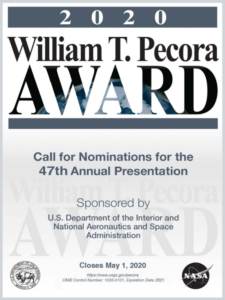 The William T. Pecora Award is presented annually to individuals or groups that have made outstanding contributions toward understanding the Earth by means of remote sensing. The Department of the Interior (DOI) and the National Aeronautics and Space Administration (NASA) jointly sponsor the award. The award was established in 1974 to honor the memory of Dr. William T. Pecora, former Director of the U.S. Geological Survey and Under Secretary, Department of the Interior whose work was integral in helping to establish the Landsat satellite program. The Award Committee must receive nominations for the 2020 award by May 1, 2020.
The William T. Pecora Award is presented annually to individuals or groups that have made outstanding contributions toward understanding the Earth by means of remote sensing. The Department of the Interior (DOI) and the National Aeronautics and Space Administration (NASA) jointly sponsor the award. The award was established in 1974 to honor the memory of Dr. William T. Pecora, former Director of the U.S. Geological Survey and Under Secretary, Department of the Interior whose work was integral in helping to establish the Landsat satellite program. The Award Committee must receive nominations for the 2020 award by May 1, 2020.
FEATURED ARTICLES
Smart Maps Guide COVID-19 Investigations and Actions, and Monitor Effectiveness

“As hundreds of millions of eyes stay glued to the rising toll and reach of the novel coronavirus disease 2019 (COVID-19), map-based dashboards have become a compelling, near real-time way to monitor the outbreak. They’ve also substantiated the message that everyone must take precautions and alter daily interactions… Geographic information system (GIS) technology underpins mapping dashboards and provides the means to investigate and understand the spread, guide control measures, and assess strategies for COVID-19 response.”
GEOGRAPHERS IN THE NEWS
- Geographer David Ley’s work on Chinese-Canadian migration featured in the New York Times
- Marshall Shepherd in Forbes on Geography’s importance in fighting COVID-19
- Terence Young, professor emeritus and author of 2018 JB Jackson Prize in Chicago Tribune for how travel is being affected by COVID-19
- Geographer Maria Gunko on declining Russian towns
- Geographer Diegos Cuadros on identifying populations most at risk to opiod addiction
EVENTS CALENDAR
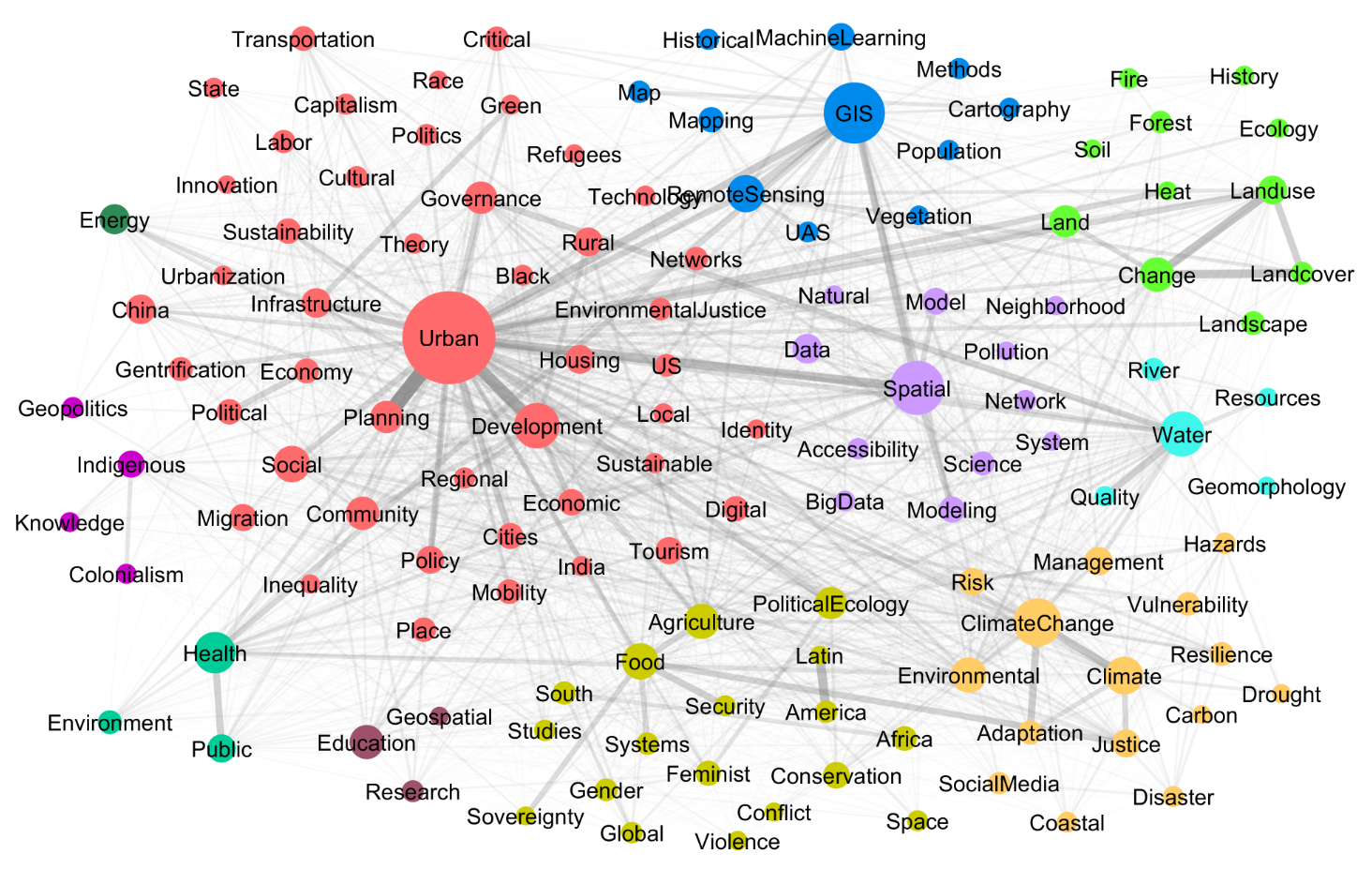

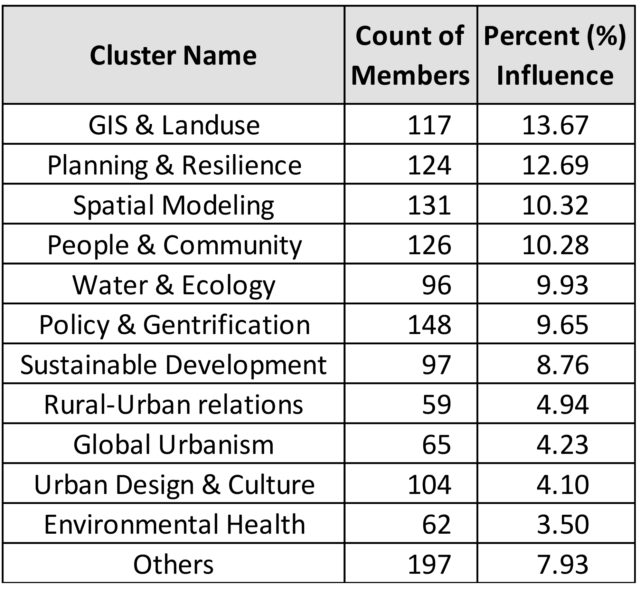
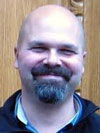 Social media can be dangerous. I recently read a post on Twitter, sent by a non-geographer, which seemed to lament geography’s absence from the Ivy League and similarly selective private institutions.
Social media can be dangerous. I recently read a post on Twitter, sent by a non-geographer, which seemed to lament geography’s absence from the Ivy League and similarly selective private institutions.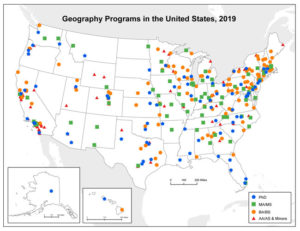 Professors lucky enough to obtain full-time employment find themselves in a variety of job environments and at different types of institutions with varied research expectations, teaching loads, and opportunity to mentor graduate students. Some geographers stand alone in a department with other faculty; other geographers are part of a large unit with 20 or more faculty and an opportunity to specialize in their specific subfield.
Professors lucky enough to obtain full-time employment find themselves in a variety of job environments and at different types of institutions with varied research expectations, teaching loads, and opportunity to mentor graduate students. Some geographers stand alone in a department with other faculty; other geographers are part of a large unit with 20 or more faculty and an opportunity to specialize in their specific subfield.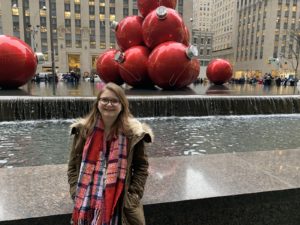
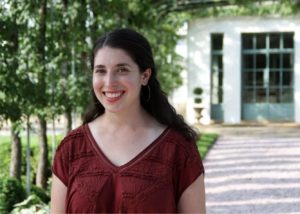 Hannah Brenner is a senior at George Washington University pursuing a bachelor’s degree in geography with minors in sustainability and GIS. Hannah is interested in sustainable agriculture and how the way we grow our food affects people and the earth. She’s worked on farms around the world and has also earned her permaculture design degree. She believes that food is key to solving many of our worlds issues. Originally from North Carolina, she has made her home in DC and loves exploring the city. In her free time, Hannah likes to garden, cook, travel, and go on hikes around DC.
Hannah Brenner is a senior at George Washington University pursuing a bachelor’s degree in geography with minors in sustainability and GIS. Hannah is interested in sustainable agriculture and how the way we grow our food affects people and the earth. She’s worked on farms around the world and has also earned her permaculture design degree. She believes that food is key to solving many of our worlds issues. Originally from North Carolina, she has made her home in DC and loves exploring the city. In her free time, Hannah likes to garden, cook, travel, and go on hikes around DC.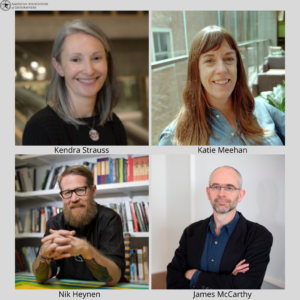 The AAG welcomes two new editors to take the positions of the Human Geography and Nature & Society editorships for the Annals of the American Association of Geographers. Kendra Strauss of Simon Fraser University will be taking over for Human Geography Editor Nik Heynen while Katie Meehan of King’s College London will assume the role of the Nature & Society Editor as James McCarthy’s term ends. The AAG sincerely thanks Nik Heynen and James McCarthy for their four years of exemplary service in these positions.
The AAG welcomes two new editors to take the positions of the Human Geography and Nature & Society editorships for the Annals of the American Association of Geographers. Kendra Strauss of Simon Fraser University will be taking over for Human Geography Editor Nik Heynen while Katie Meehan of King’s College London will assume the role of the Nature & Society Editor as James McCarthy’s term ends. The AAG sincerely thanks Nik Heynen and James McCarthy for their four years of exemplary service in these positions.